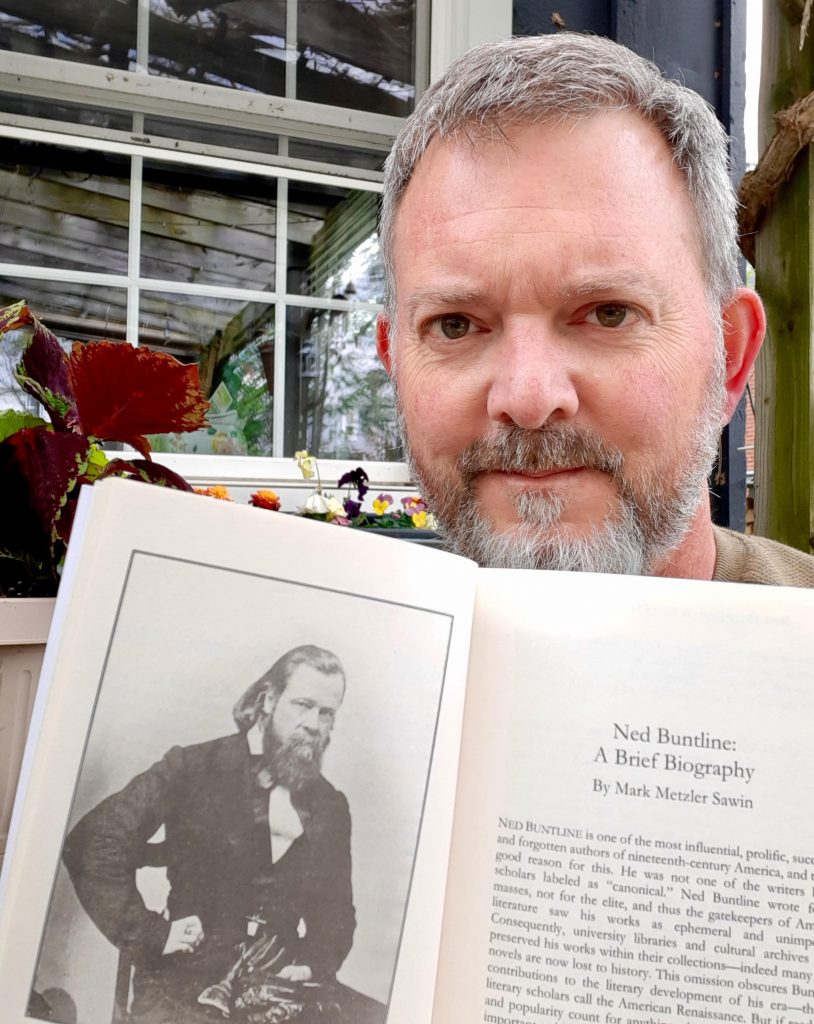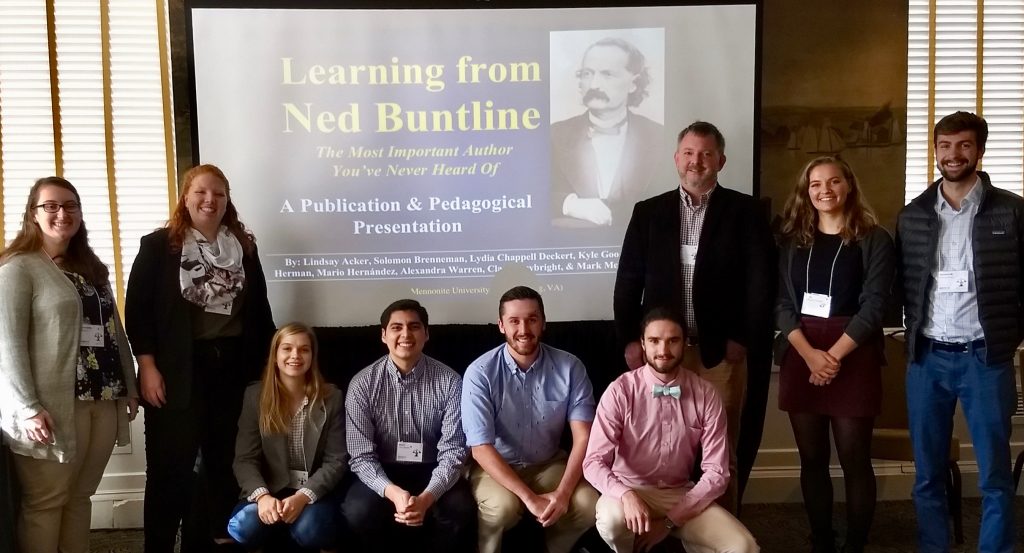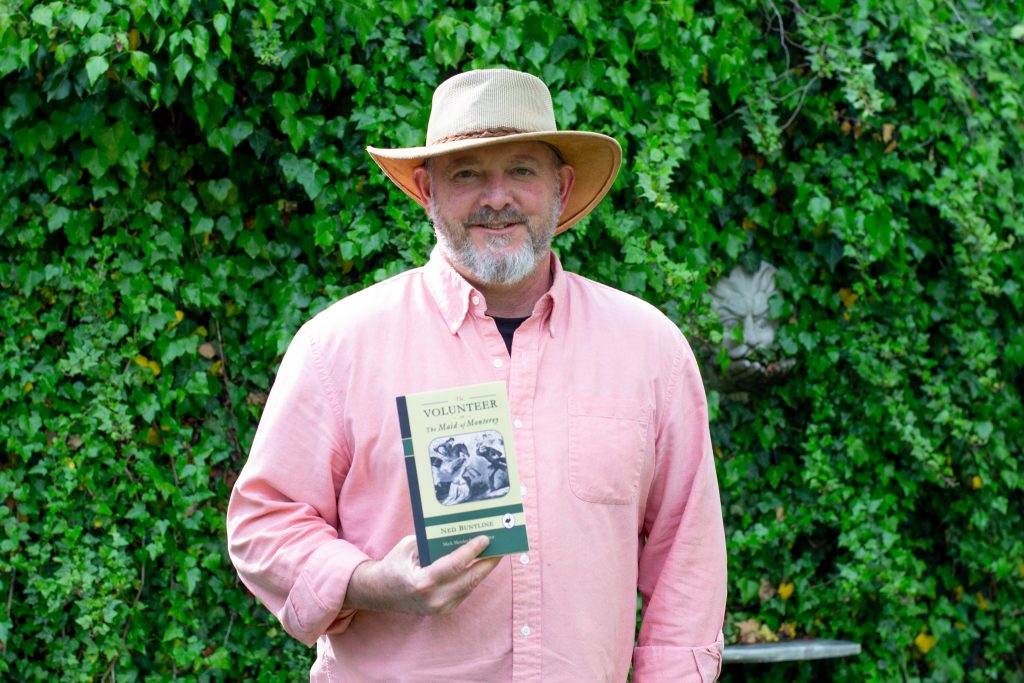“ … he saw her, and also to his horror saw that a lighted match was in her hand, and that she stood by a train of gun powder, which led to a barrel of the same dangerous material …” so writes Ned Buntline in The Volunteer, or The Maid of Monterey. The dashing tale, written to appeal to the drama-hungry common reader, was based on headlines from the Mexican-American War. Its cross-dressing heroine and other characters, noble and despicable, were based on figures from Buntline’s own rougish life.
The Volunteer is the first title published by Emu Editions – the brainchild of Eastern Mennonite University Professor Mark Metzler Sawin, who has set out to reprint some of the most popular works of the 19th century that have largely been lost to history. Sawin, with the help of eight students, dug into records of Buntline’s life and the turmoils of the day to annotate and contextualize The Volunteer.
This edition includes a biographical essay written by Sawin. Edward Zane Carroll Judson, who wrote under the pseudonym of Buntline, popularized genres such as Westerns, crime noir, and pirate novels for the American public of the mid- to late-1800s.

“He’s fun to research because he’s an absolute scoundrel,” Sawin said. Buntline’s actual life was as swashbuckling as his fiction – he married nine times to eight women (one of them twice), survived an attempted lynching in Nashville, incited a riot over a Shakespeare play, apprehended two murder suspects single-handedly – the vignettes go on.
And although Buntline was a household name in his heyday, most of his 170-some books were printed on cheap paper and never preserved.
“Those books tend to be almost nonexistent, even though they were bestsellers at the time,” Sawin said. A few years ago, he drove to a tiny museum in the Adirondack mountains of New York with his daughter, Cora, because they had about 12 boxes of Buntline’s writings. The papers were saved from a remote cabin Buntline had lived in during the 1850s and 60s.
Those boxes held “the only surviving copies of dozens of his novels that people thought were lost,” Sawin said.
He enjoys assigning Buntline in his 19th century history classes because, not only are the books a fun, “weird” read, but they also provide a snapshot of the national and cultural events of the time. In researching The Volunteer, Sawin’s students tracked down references to people and events scattered throughout the narrative.
It was “a detective story of figuring out who all these figures are,” Sawin said.
Student researcher Lindsay Acker cracked the code on the main antagonist in The Volunteer – an attorney named Gorin, whose name was taken straight from Nashville attorney Franklin Gorin. Acker sleuthed out his identity through area newspapers from the mid-1840s.
“I found the name again in a list of speakers at a Whig party rally,” Acker said. “I just started following the rabbit trail and ended up finding letters and speeches published in the newspaper from a few book characters about various parts of the Nashville scandal. I also did some searching on family trees from FamilySearch.org, and found some familial connections in Nashville between characters that made a whole lot of sense.”
“It was a huge break to figure that out,” said Sawin.

Last summer, the students accompanied Sawin to the Mid-Atlantic Popular and American Culture Association conference in Baltimore, where they presented their research. This trip was a highlight of the experience for Mario Hernández. One of his contributions to cracking the code of Buntline’s writing was to determine the origins of words that Buntline had misspelled or a typesetter had misinterpreted.
“There were two words for flowers that we had just assumed were created by Buntline – or ‘sprang from Buntline’s fertile mind’ as Mark eloquently explained,” Hernández said. “Upon closer inspection, these words turned out to be misspellings of actual words in Spanish.”
This sort of context makes the Emu Edition especially useful to college history and literature classes, which Sawin expects will be their main audience. He’s selling the book through Amazon’s print on demand service, which allows him to price it at $11.95 a copy. His goal is to make it affordable to assign to students.
The heroine of The Volunteer is merely the first character to be visited by Emu Editions. Sawin plans to engage students next year to work on another Buntline story, The Black Avenger of the Spanish Main, a classic of the day that Mark Twain’s Tom Sawyer reenacted scenes from.
Another he’s considering is Ella Adams, or The Demon of Fire, about a Yankee schoolmarm who is half lynched, rescued by enslaved people, and works with them to set literal fire to Charleston, South Carolina. And within the relatively small world of 19th century literature scholars, Sawin hopes to invite others to submit their own annotated titles to Emu Editions.
Why the name Emu? Sawin wanted another flightless bird in his logo as a riff on Penguin Random House publishing. The dodo was already taken by another company, and besides, working at EMU has given him an affinity for its homonym.

How fun! What a great way to learn history!
Earl Martin
What fun! What a great way to learn history!